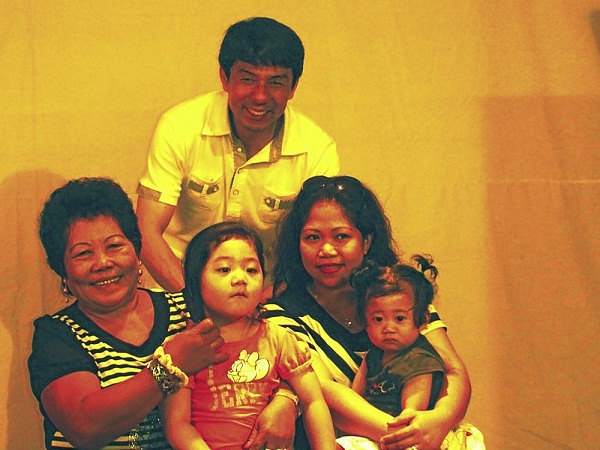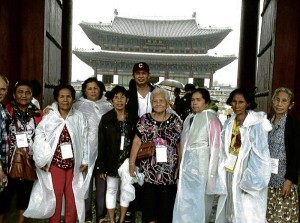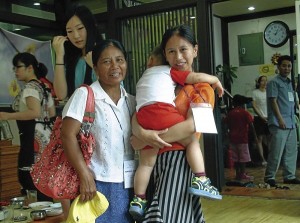‘Meet the Parents’ in South Korea

ESTER DUZON (right) and her family in a happy reunion pose with mother Rosa Tamidles. Photo By Rochit I. Tañedo
DAEGU CITY—Forty parents of Filipinas married to South Koreans arrived last July in this South Korean city, the third largest after Seoul and Busan, to a rousing welcome by 500 guests that included a former prime minister and corporate chief executive officers. The parents, granted two-month visas, would sample Korean life and bond with their balae, the parents of their sons-in-law, and grandchildren for the first time.
It was the “2nd Meet the Parents” activity of Asian Bridge, a nongovernmental organization dealing with migration and multiculturalism issues. The program attempts to mitigate problems of social isolation felt by some of the migrant wives.

THE NGO Asian Bridge flew over 40 parents of Filipinos married to Koreans to meet the parents of their sons-in-law and, hopefully, bridge the cultural divide. Photo By Rochit I. Tañedo
In 2010, they had flown in parents of varying nationalities but it did not achieve the desired bonding since there was no common language, said its executive director Han Jae Heung. This year the strategy was to bring in parents from one country at a time.
Feted to fancy holiday tours and sumptuous Korean meals, the families enjoyed the blissful reunion with student volunteers carrying their bags and babies.
Bride shortage
Perhaps this amazing display of hospitality is not surprising. South Korea’s economy ranks 14th in the world. But it also faces many problems. There is an aging population, low fertility rates (as of 2009, the second lowest in the world) and a shortage of brides. The Filipina migrant-wife population at 11,000 comprises 15 percent of the estimated 85,000 documented and undocumented Filipinos in South Korea, mostly industrial laborers.
Mixed marriages make up 12 percent of all marriages in South Korea. About a third of the migrant spouses come from China and Vietnam. The rest come from Cambodia, the Philippines and Japan.
Jung Bub Mo, formerly of Asian Bridge Philippines and now a doctoral student at the University of the Philippines, explains why South Korean men have difficulty finding wives. “For those choosing to remain in the farms, there is significantly less opportunity to marry since Korean women aspire to higher standards of living and benefits only available in the cities,” Jung says.

REMEDIOS RAMEL (left) with daughter Nelgilyn and grandchild during the “Meet the Parent” leg in Seoul. Photo By Rochit I. Tañedo
Although today the gender ratio at birth has normalized at 100.6 boys for every 100 girls, many eligible Korean women go to college and find highly paid jobs in the cities. Many have chosen to postpone marriage, sometimes foregoing childbearing altogether.
Agency matchmaking
“At age 37, I knew I was too old to look for a Korean wife,” said Park Jeong Yin, a tall and shy factory worker from Pohang City. “My mother kept pressuring me to find a wife, so I tried these matchmaking agencies (a booming business until today in Korea), but because they grade applicants according to income, I always didn’t make the grade.” A friend who was married to a foreigner told him a Filipino matchmaking service might offer better chances since Jeong Yin could speak “a few basic English words” and so could Filipinas.
Ester Duzon, 28, had listed herself in a mail-order catalog. She recalls: “My well-to-do aunt would scoff: ‘Your sisters went to college but we’re still living in the same dump.’”
Home for Ester and her mother, 56-year-old Rosa Tamidles, was a 10-square meter accessoria atop the estero bordering San Beda College on Mendiola Street. One can reach it by going through a maze of narrow alleys. “That really stung my ears,” said Ester. At the same time she deplored the choices her sisters had made. “So many children, no jobs.” Ester’s salary at a school canteen went to her kin’s food, tuition and school projects. Left with no savings, she had said to herself: “This life is not for me.”
Jeong Yin was shown the catalog. “You tend to go by the photographs,” he said. With his choices down to four, he arrived in Manila with a dozen others in 2007. His first choice was only 20 years old—a 17-year difference between them. “I must admit that I was greatly attracted to her. But after our first date, I thought: How could we have a life together? You see, she wanted to come to Korea and be a singer. So I said I might give the next one (Ester) a try. Her reason for going to Korea: ‘I want to help my husband-to-be.’”

SHARON SAIWA and her husband don traditional Korean wedding garb for a mock ceremony at Young Ju cultural village near Daegu, South Korea. Photo By Rochit I. Tañedo
“When a woman answers like that, you could tell yourself: Maybe it’s not true. But you are searching and hoping. I guess it was the kind of thing I wanted to hear,” said Jeong Yin.
A second date was arranged. “She was outgoing and sociable, always finding out what was the problem, while I was the introvert. I felt she could belong anywhere.” After that, Jeong Yin proposed marriage and met his prospective in-laws at their residence. “It opened my eyes,” said Jeong Yin, seeing where and how his future bride lived. “I knew I could offer her something more,” he said modestly.
Living with mother
Through the years, Filipina wives have come to migrant centers seeking counsel regarding the racial discrimination they face. When asked what is the first question they should have asked on their first date, the Pinays chorused: “Do you still live with your mother?”
All too often, the Filipina dreams of having her own flat, but this is not the case for most. Many say the Korean mother-in-law is the authority in the home, not her son. She has to eat ahead of the rest. She also knows that her son spent a huge amount to find a wife, so she expects obedience as a return on investment.
Differences in food culture result in skirmishes everyday. For example, Koreans have three full meals a day and no in-betweens so they feel slighted when the Pinay wife eats only a small portion of what is served. Pinays, on the other hand, confess to going dizzy without snacks. Koreans have more steamed and boiled meals and complain that Filipinas, so used to sautéing food, use up too much cooking oil. Filipinas echo their disdain for leftovers left to ferment in the fridge but Koreans are used to buro or fermented and preserved foods.
Such high standards for house cleaning are also unheard of here. “‘Get down on your knees and scrub everyday,’ my mother-in-law insisted. And as if to rub more salt on my wound, my husband would criticize me even more when he came home,” said one migrant wife.
Then there is the matter of children. Some wives noticed a big change in attitude once they got pregnant. “My mother–in-law changed her tone of voice and was just so solicitous, I was so surprised,” said one. Another felt her mother-in-law was crossing the line when she admonished: “Now that the baby is here, you should focus on the baby and not yet sleep with my son.”
Practical needs
Another issue has to do with finances. Wives clamor for an allowance for long-distance calls. Many still need to send money back home.
Prof. Carolyn Uy Ronquillo of Woosong University observes conflicting mind-sets: “The Korean says: Once married, you focus on nothing but your husband and children. But the Filipina says: Marriage doesn’t mean you forsake your own family, even as you gain a new one.”
She adds that knowing the Korean language is so crucial in transitioning to migrant life, including finding a job.
Wang Ta
Kwang Jin Cho, chair of Asian Bridge Daegu, says: “Discrimination is a reality in Korean society as ours is really a closed society. We’ve never been a melting pot and we’re not really used to foreigners. But through our efforts in ‘Meet the Parents,’ we want to show that inclusiveness is important, and not only preserving the Korean bloodline.” He says politicians and business leaders are crucial in sending the message out that it is important to build linkages with migrants early on as bigger problems will arise sooner or later.
“These intermarriages were so rare before, but now you see a ‘mixed child’ in almost every class in elementary and middle school,” observes Jin Cho.
Jung Bub Mo adds that Wang Ta or school bullying is a big problem. Thirty-four percent say they are bullied “because my mother is a foreigner,” 20 percent cite “problem with communication” and 15 percent say “no special reason.” Wang Ta is also one of the reasons why there is a huge disparity between Koreans and multiethnic children in school. Korean children, on the whole, finish elementary, middle school and high school, and 90 percent of them are in college. Among mixed children, only 80 percent finish elementary and middle school, and only 65 percent finish high school.
Consul Iriciric Arribas cites some positive gains. Filipina-Korean Jasmine Becaymo Lee of Davao City now sits in Parliament, owing to her popularity as a champion of migrants’ rights. “She is the first Filipina and naturalized Korean to become a lawmaker. That is one manifestation of South Korea’s acceptance of its role as host,” Arribas says.
Kim Jea Yun, social worker at Dong-gu Multicultural Family Support Center, appeals for balance, saying: “‘Meet the Parents’ brings temporary relief but after two months, it’s a one-way street again. Having been used to a closed society, Koreans have not an iota of knowledge of the situation of the wives. Listening to seminars about a culture is different from experiencing it. The Korean man and his mother ought to visit the Philippines and see how the other half lives. If you don’t see it and experience it, you have no picture; you can’t really grasp what she is going through. It can go either way, but we have to take that risk. Because that experience can lead to compassion and that is what we need.”
(Jeong Yin is a pseudonym)














